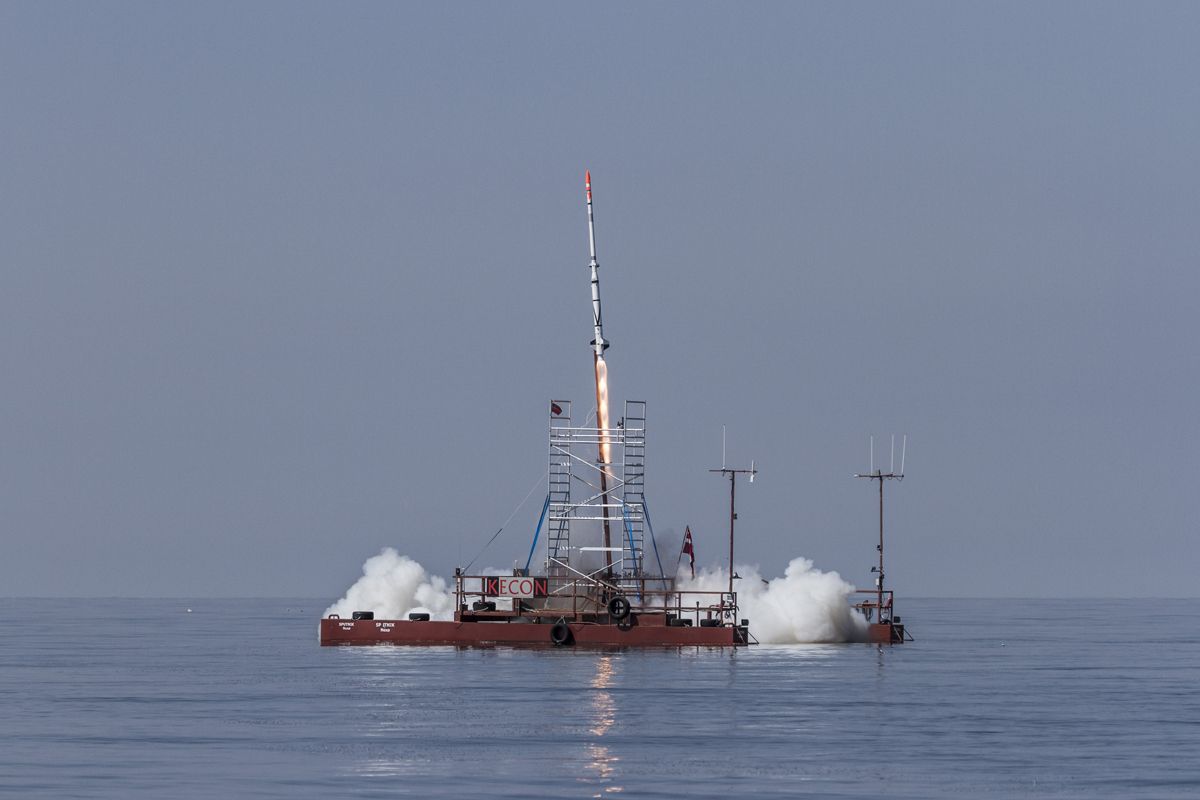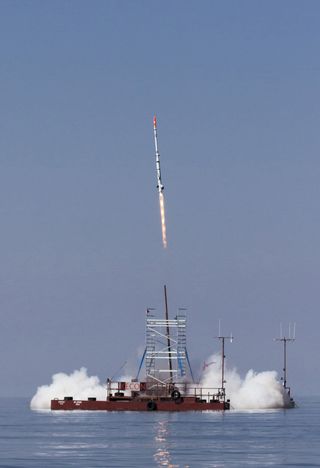Danish Space Travel Team Launches Private Rocket Test

A Danish group of amateur spaceflight enthusiasts launched a homemade rocket Friday (July 27) on a trial flight to test vital technologies for a private manned spacecraft.
The team Copenhagen Suborbitals launched its two-stage unmanned rocket SMARAGD-1 from a floating platform in the Baltic Sea to test long-range communications gear, rocket stage separation systems and other equipment needed for its planned larger crewed spaceship. The rocket was expected to reach an altitude of about 12 miles (20 kilometers) during the test flight, according to a mission description.
The launch marked the first mission for the non-profit Copenhagen Suborbitals since a 2011 test flight of its HEAT-1X rocket and a space capsule prototype. The group is now developing a small, one-person space capsule (called Tycho Deep Space) that resembles a miniature Apollo spacecraft.
"What a fantastic day!" Copenhagen Suborbitals co-founder Kristian von Bengtson wrote in a post-launch message on Wired magazine's Rocket Shop blog, where he has been chronicling the spaceflight project. "Thanks for all the support, viewers and donators."
About 50 Copenhagen Suborbitals team members watched over the launch from a mission control ship on loan from the Danish National Guard. [Private Space Travel by Copenhagen Suborbitals (Photos)]
Photos released by Copenhagen Suborbitals show the rail-launched SMARAGD-1 rocket soaring into the sky from the group's Sputnik sea-based launch platform off the coast of Bornholm, Denmark. The black-and-white rocket, tipped with a bright orange nose cone, launched into a blue sky in what appeared to be calm sea conditions.

"This SMARAGD-1 launch will be short fueled deliberately to have a controlled test and stability verification before going all the way," project officials wrote.
Sign up for the Live Science daily newsletter now
Get the world’s most fascinating discoveries delivered straight to your inbox.
Copenhagen Suborbitals formed in 2008 with the goal of launching a person into space on a completely privately built spacecraft using a non-profit, open-source project. In 2010, the group's launch attempt failed to fly due to a malfunction. The 2011 test flight reached an altitude of 2 miles (3.2 km).
The SMARAGD-1 launch is the highest launch yet for Copenhagen Suborbitals. It is one of several missions planned by the private spaceflight group for this year. However, another major test flight — a launch escape system demonstration for the Tycho Deep Space capsule — has been delayed, von Bengtson wrote.
The escape system test, which would launch a space capsule prototype equipped with a rocket-powered escape tower, was delayed when a fuel tank for the capsule's launch escape system failed a pressure test, von Bengston explained in an earlier Rocket Shop post.
Copenhagen Suborbitals officials plan to launch three other unmanned rockets, including another SMARAGD rocket flight (SMARAGD-2) and two flights of an active guided rocket called Sapphire.
This story was provided by SPACE.com, a sister site to LiveScience. You can follow SPACE.com Managing Editor Tariq Malik on Twitter @tariqjmalik. Follow SPACE.com on Twitter @Spacedotcom. We're also on Facebook and Google+.

Tariq is the editor-in-chief of Live Science's sister site Space.com. He joined the team in 2001 as a staff writer, and later editor, focusing on human spaceflight, exploration and space science. Before joining Space.com, Tariq was a staff reporter for The Los Angeles Times, covering education and city beats in La Habra, Fullerton and Huntington Beach. He is also an Eagle Scout (yes, he has the Space Exploration merit badge) and went to Space Camp four times. He has journalism degrees from the University of Southern California and New York University.











